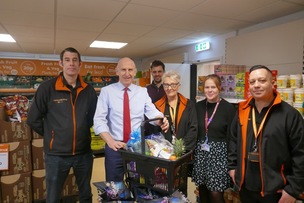POLICE working to combat a new strain of synthetic drug known as ‘monkey dust’ - which leaves users in an aggressive state -Â are hoping to avoid it becoming the next ‘spice’, the Chronicle can reveal.
Problems with another synthetic drug known as spice have been blighting the town centre for more than a year, with users regularly seen collapsed in a zombie-like state.
But now police are beginning to receive reports about the growing prevalence of ‘monkey dust’, a powerful substance which was previously sold under the name of Ivory Wave as a former legal high.
It has the opposite effect of spice and a hit is available for as little as £2.
According to Public Health England, monkey dust - also known as MDPV - is a potent strain of class B methamphetamine and appears as an off-white powder which can be sniffed, eaten or injected. The matter was discussed by bosses at a county crime meeting before Christmas, leading Dr Alan Billings, South Yorkshire Police and Crime Commissioner, to express his concerns.
He told the Chronicle: “It’s much stronger than spice and its rise is worrying, although at this stage it’s important to stress we have not seen a great deal of it in Barnsley or indeed South Yorkshire as a whole like we have with spice.
“It has very different effects so whereas spice leaves its users in a zombie-like state, often resulting in them being unconscious on Barnsley’s pavements, monkey dust is the opposite and causes people to be lively and aggressive.
“Small quantities can be dangerous and our officers, particularly where we have seen spice abuse such as Barnsley, are being proactive and alert.”
Small doses of the drug give users an ecstasy-style high, but larger amounts leave users hallucinating and paranoid, according to health bosses who issued a warning following the first signs of the drug which appeared in the West Midlands and Manchester last year.
Barnsley Council’s Safer Neighbourhood Service, whose officers work alongside the town centre-based police team at Churchfields Police Station, said monkey dust was a separate issue to a previous problem last year believed to have been caused by a ‘super-strength’ strain of spice the new substance is an altogether different type of drug.
Dr Billings added: “Like spice, monkey dust is cheap but although the abuse of that drug continues to be a problem, one thing its users aren’t is aggressive.
“So when monkey dust’s effects are talked about, clearly it’s more of a concern in that respect as people can be unpredictable when they’re under its influence.
“It’s important the police are alert at this point before we see an escalation, like we have with spice, and to not have another former legal high taking hold.
“Ideally we want to eradicate drugs from our streets completely as additional resources are required to deal with them.
“One thing that’s great about Barnsley is its policing team and its council’s willingness to work alongside each other to solve problems. The public space protection order (PSPO) that’s in place there is also a great tool to have.”
The current PSPO - which is designed to deal with problem behaviour in a particular area and allows councils to effectively ban offenders from the town centre - is due to end in March but is set to be extended for another three years until 2022.
The PSPO is being shaped with the public’s help, after a consultation process ended last month and the details of its new format are being discussed.
The order was brought in across the town centre and some residential streets in 2016, focusing on Barnsley Interchange and Peel Square before it was extended to cover McDonald’s and Asda, off Old Mill Lane.
Town centre police are conducting regular high visibility patrols, holding crime reduction stalls in venues such as the interchange and public meetings in order to engage with people expressing their concerns about drugs.
Feedback gathered by them suggest the use of former legal highs in the town centre remains one of the public’s most serious concerns.
Chief Superintendent Scott Green, the town’s district commander, added: “It’s a complex issue to deal with which involves key work alongside partners, but it remains a priority for us in 2019.
“There have been successes in terms of arrests of those involved in drugs supply offences and discussions remain ongoing with partners regarding innovative approaches to deal with it as a broader partnership issue.”




























